Is 'Solar Farming' the Way Forward?
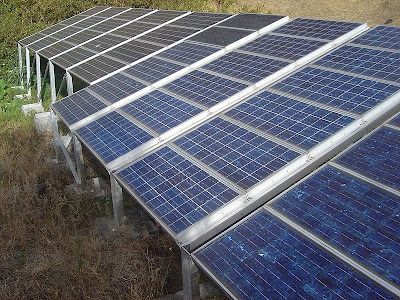
Sometimes a local issue comes along which serves to make my brain hurt very badly as it raises so many others and I simply don't have the answers. The news last week that a Chippenham farmer nearby is proposing to convert 35 acres of his land to solar panels falls firmly into this category. That's 'solar farming' on the scale of around 15,000 moveable panels, each the size of a door and arranged in rows in a field(s) to maximise their capture of the sun's energy.
There was quite a lot of talk about it on Saturday at our local resident's association quiz evening which NAH and I attended*. We're now expecting a 'call for action' email any day now and naturally the main point of concern raised so far is what this means from an aesthetics viewpoint.
That's the least of my concerns and I'm having a major tussle with myself over whether this is a good thing or not. My greener living head says it is because it means we're making more use of a renewable energy, but my we as a nation need to grow more of our own food head is rather concerned about another way in which our farmland is being taken out of cultivation.
I can also appreciate the farmer's viewpoint. If I was he and I found a scheme which pays for itself in about ten years and then offers a guaranteed income for 15 years way above what I could get from conventional farming, I'd be giving it some serious thought too.
But then I'm sure the last government didn't quite have 'solar farming' on this scale in mind when they set up the Feed in Tariff scheme to help them meet their 2020 carbon emission reduction targets. This is chiefly designed to encourage home owners and small businesses to set up solar panels on their roofs: indeed I've been trying to persuade NAH that we should do so. The reports I've found so far in places like the Daily Mail and by The Energy Conservation Group aren't in agreement on if and how long the larger field sized schemes will be allowed to continue.
What seems to be clear is that any legislation plugging this loophole won't be applied retrospectively, so we can expect lots more planning applications by farmers for solar panels in England over the next year or so. I wonder how much of our farmland will be taken out of production as a result.
I also wonder how the land will be managed over the 25 year life-cycle of this scheme. The local farmland in question is currently used for grazing, but I don't think animals will be allowed to coexist alongside the panels. If not, how is the vegetation going to be kept in check all that time so it doesn't block the sun? I can't see the land being co-managed for wildlife either. And what happens to all the paraphernalia when the land is restored back to how it is now? Does this give us net good or bad benefits (environmental or otherwise) over the life-cycle?
As usual with these things I have more questions than answers and I see there's a public meeting arranged about this issue next month. Perhaps I'll get some answers then?
* = which we won - hurrah!
NB Having no picture to hand of what massed banks of solar panels in a field look like (though this link to the article about this issue in my local paper gives you fair idea), I've used a photo courtesy of David Moniaux via Wikimedia.
Update 7th Feb 2011: The government have announced today a review of the FIT scheme as it isn't designed for solar farms such as the one I've discussed. More details here.
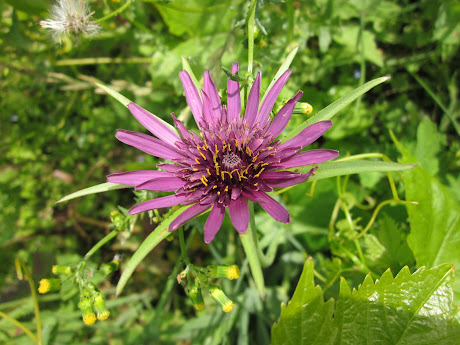
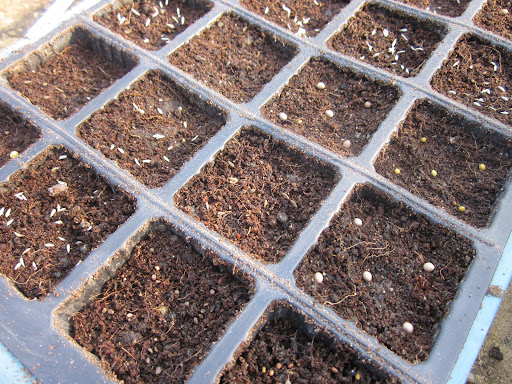
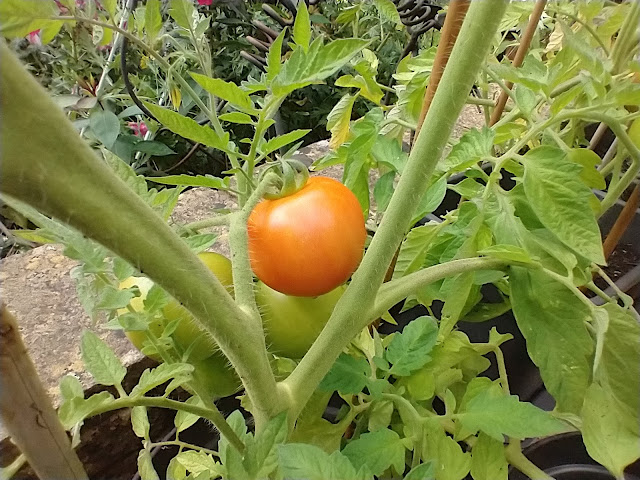


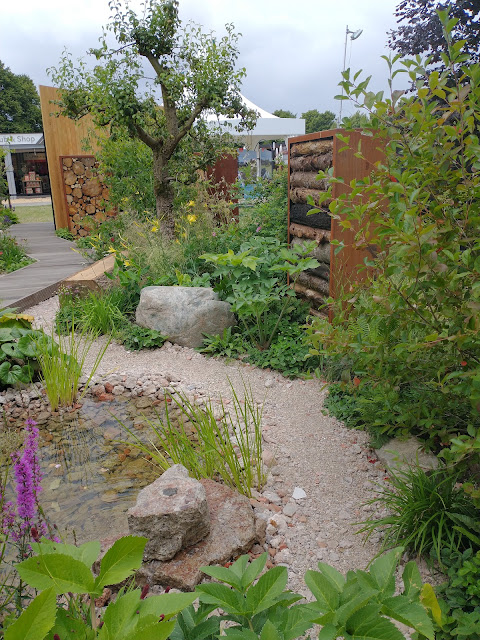




Of the four main renewable technologies:
ReplyDelete-Solar hot water
-Hydro electric power
-Wind Power
-Solar photovoltaic
the last one is currently the least efficient and slowest payback. Wind is much better and you can still farm the land underneath it. If only people could start seeing wind turbines as beautiful (handsome is as handsome does in my view), we could generate a lot more energy from a lot more land.
Solar hot water is superb - works a treat, good payback (we have one), but until panel efficiencies rise, we should leave solar PV to regions with high sunshine rates.
Hi Sue - you've just summarised why NAH (with his engineering head on) isn't convinced that solar panels are for us.
ReplyDeleteI actually find wind turbines quite elegant!
Good post from Sue. I'm not sure either as it dosen't seem a good use of so much land.
ReplyDeleteIt's really tough working out where to stand on all this, isn't it. You raise really good issues about the management of the weeds etc, loss of wildlife habitat, loss of growing space. I agree with others that wind turbines are actually rather beautiful, but if they are badly balanced they can make an awful noise. My OH is worried that the current feed-in tariff will be cut as part of the "cut the deficit" campaign (see bbc article), or the halving of electricity costs and payback period of around ten years would have me convinced even with our comparatively low sun levels. The technology is improving all the time, I happen to believe we should invest and become expert in engineering photovoltaics, developing engineering expertise and creating high value jobs. But turning whole fields into solar farms? I'm not convinced, it would make much more sense to cover public buildings with cells where they have the correct orientation and are not shaded.
ReplyDeletePS WV was "rhescur", which seemed appropriate...
Hermes - I'm sure there are better ways to do it than this such as the way Plantaliscious has suggested.
ReplyDeletePlantaliscious - I wondered about that too, but the energy conservation group article I linked to confirmed that it wasn't cut and is set to be available until 2013 at least.
Seems like a crazy idea given I've just watched a report on the news about the following:
ReplyDeletehttp://www.bbc.co.uk/news/science-environment-12249909
Perhaps if farmers were paid a commercial rate for the food they provide by supermarkets they wouldn't end up looking at schemes like this. Higher food prices might make us (as a country) less wasteful?
Hi Rob - thanks for that. I was looking at the TV version of that report this morning and thought the same. It seems the figures are a bit skewed when a relatively efficient industry (farming) makes far less money than an inefficient one (energy using PV cells). I'm sure the food the farmer could produce from that land would feed many more families than the homes it could light and heat. That's all part of the net good or bad calculations I was referring to at the end of my piece.
ReplyDeleteI agree wind turbines are beautiful but two near where I live have fallen over in the wind - one at a school and one by a marina where there are offices, workshops and cafes as well as boats.
ReplyDeleteDangerous.
I definitely don't think this is a good use of land. Solar panels on the tops of houses don't look good but they are not taking space which could be used for something else. I'm wondering if the farmer might farm out his panels to local rooftops. Perhaps the farmer might build houses under the panels if there are to be no crops in the field? Houses are useful too.
I'm also wondering whether the panels will be easily stolen or damaged - which would mean high fences / barbed wire round the field.
Food, air plants - all needed.
Not that I blame the farmer. We often get the idea that farming is about beauty. It isn't. It's an industry. (Quite rightly so.) Beauty, if it exists, is an offshoot. Whether it is the best use of land in a wider sense is a government / planning decision.
Lucy
P.S. Except the government is busy throwing all its responsibilities up in the air, hoping they will be caught by volunteers from the local golf club, the W.I., meals on wheels or those with the most time and loudest voices - which makes it all very hit and miss what will happen.
P.P.S. I've just realised. The farmer is probably having to convert the land for low maintenance to free up time for running the library.
Hi Lucy - lots of food for thought as usual from you! Yes, they're talking about an 8 foot high fence where it might be needed.
ReplyDeleteI don't blame the farmer either - after all he is running a business. Using the farm for housing is a moot point around here though as 3 owned by the local council have been earmarked for just that in the town's 2025 plan.
I must check on what's happening about our local library - reduced opening hours I think. However, there was a little snippet next to the local paper's article on this saying that the council is looking to apply for Green Flag status for John Coles Park and getting a 'Friends of the Park' group together. Perhaps he'll be helping out with that instead ;)
Thought provoking piece VP!
ReplyDeletekeep us posted.
No pun!
Best
R
wind turbines do seem a more logical use of resources. i am wondering how cost-efficient the smaller house size solar panels are. there has been some squabbling over installing land-based wind turbines due to alleged harm to wildlife caused by the sound/vibration. what is NAHs' opinion on this?
ReplyDeleteI guess the easy answer we are looking for doesn't exist. We may have to cut back on the amount of energy we use rather than increase the amount we produce.
ReplyDeleteOur local park (not the one by the castle) was taken over by volunteers a few years ago. It's very difficult. When you go in, you feel you are treading into someone else's preserve. You also know they are they are putting their own and devoted work into it so you are reluctant to suggest it could be done differently. It's a 'no footballs' kind of place with a couple of circular beds with roses that are cut down to eight inch sticks in the winter. Bleak.
ReplyDeleteWhat would be good would be . . . an ice-cream van in summer, a nice place for picnics, some vine tunnels for children to run through . . . quick growing flowers which will pop up again if knocked over . . . local bands . . .
Hardly any of us have the time or the skills to contribute to turn it into something more vibrant, the people doing it are doing it and . . . I'm frightened about what will happen when all our community activities are taken over by good people with dull ideas and not enough energy to make things sparkle.
About wind farms and wild life - there are proposals from time to time to have wind turbines planted off our post. Some experts are worried it would interfere with sea creatures and the breeding habits of sea birds. Something, somewhere will have to give.
I'm not sure the will is there to cut back on enough energy consumption to sort the problem. Capitalism depends on growth to keep society working. Who will volunteer the idea of a new-style economy that fits the needs of the whole world?
Hmm!
Lucy
When I'm back on my feet & able to drive again, I'll drive over to a corporation's headquarters across from the junior college here. The south lawn/meadow of the corporation is filled with solar collectors. I think they look kind of neat. (If you want to see what they look like from space, type in Harper College, Palatine, IL, then go to the corner of Roselle & Euclid & zoom in on the north side of Euclid. Street view is no good, because the shots were taken during installation of the 1st one.) I approve of the use of them on suburban corporate campuses which would otherwise be just a lawn of grass that needs watering, fertilizing and mowing.
ReplyDeleteHmmm. Not convinced by a field full of solar panels.
ReplyDeleteWe've had 2 solar panels on the house for about 9 years now.They do all our hot water in summer and raise the ambient temperature of the tank in winter. They paid back about 18 months ago.
Chesterfield now has quite a few public buildings with PV panels on the south facing roofs.
I love the big wind turbines. We had a 100ft high anomometer tower in the garden for a year to test for wind quality, but it wasn't consistent enough to have our own smaller turbine - which made our neighbours happy anyway!
This is a really thought-provoking post. My instinct is to support as many forms of alternative energy supply as possible, but i have the strongest doubts about solar panels.
ReplyDeleteTo feed 9 billion souls, we're going to need to double agricultural output worldwide. And it makes sense to produce as much of our own food as we can. As plant breeding makes progress, increasingly poor land will become productive and I suspect that we'll need as much as possible for farming food.
One final - possibly irrelevant point: I think that growing crops to produce petrol or diesel is an obscene idea and makes not one jot of sense. It has already caused damage and hardship and should not happen.
If - each house had its own solar panel for hot water - as ours does - (and there is enough sun in Switzerland to generate power to recharge electric cars). Then we wouldn't need so many power stations and power lines striding across the country. If - the solar panels were on office blocks, and schools and hospitals and factories. Then how many power stations would become surplus to requirements??
ReplyDeleteI am deeply suspicious - this feels like it is about short term money scheme not some genuine answer to our energy problems. Aesthetically I fear the worst - and we should not underestimate aesthetics and the impact on our spirit; wind farms are disgrace. It simply isn't acceptable to say they are beautiful - they are inappropriate in wilderness landscape such as Plynlimon in Mid Wales where they devastate millions of years of landscape.
ReplyDeleteWe are having much the same controversy here over wind turbines. While wind seems like a great renewable resource and doesn't take that much farmland out of production, many people object to their looks or the noise--always that "not in my backyard" attitude. But solar panels? I'm not so sure the amount of energy produced by them would justify using farmland for this. You've raised some excellent questions, VP; I hope people take all these into consideration before jumping on the solar farming bandwagon.
ReplyDeleteRobert - will do!
ReplyDeletePetoskystone - NAH's an engineer who started his career working on power turbine generators so his thoughts are firmly in the realm of how efficient PVs are rather than wildlife impact. He leaves that one to me!
Carolyn - sadly most people aren't prepared to cut back, they see that as an erosion of their lifestyle no matter how powerful the environmental argument may be.
Lucy - I believe that if parks are 'given to the people' there's a danger that there isn't the vision needed to make the best of what's there. Yes, we need more say in what we'd like (and even help), but I'm certainly not the best person to put it into practice.
MMD - I look forward to seeing your pictures :)
Nutty Gnome - the takeup of PVs on public buildings hasn't really got going here. Perhaps they should. Thinks - perhaps the council could use the Feed in Tariff scheme to replace some of their govt income that's been cut? ;)
PMN - that's not irrelevant at all, I'd love to see just how much land is needed to produce all biofuels we need. I suspect it exceeds all the land we have in cultivation!
EE - I wonder how long it will be before installing solar panels becomes planning law?
Mark - aesthetics was discussed a plenty on Saturday, so I chose to write about the other issues which I'm concerned won't be discussed or considered so forcefully.
Rose - it'll beinteresting to see what happens and gets discussed at the meeting next month
Re EE's comment re solar panels on roofs, I have been driving my other half nuts for years, because every time we drive past a new housing development I have a rant about the orientation.
ReplyDeleteWe should have been putting solar panels on all new builds, especially commercial new build, for the past 10 years, but in the absence of that it should at least have been compulsory for every house to have at least one south facing roof aspect. At least then panels can be retrofitted. But if you haven't got that, you're stuffed.
Sue - thanks for coming back and adding to what's been a good set of comments and debate on here. I wish solar panels on new builds had become planning law ages ago.
ReplyDelete